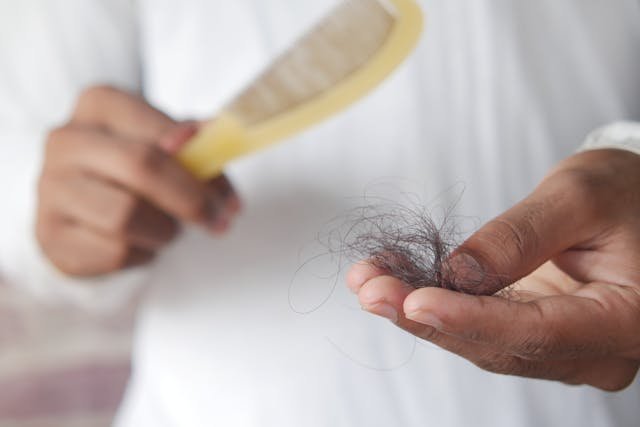
Thinning hair can catch you off guard. One moment you feel great with a full head of hair, and the next, you might find more strands in the shower drain. For many, it’s a hereditary issue. For others, factors like lifestyle, stress, and the environment play a role. Regardless of the cause, seeing changes in your hairline or a widening part can be daunting. But here’s a silver lining: thinning hair doesn’t have to define you or your self-esteem. Let’s explore the reasons behind it and the steps you can take for healthier, denser hair.
It’s Not Just Psyche—But It Partly Is
Let’s first delve into the causes. Genetics are often a primary factor, with conditions such as androgenetic alopecia (commonly known as hereditary hair loss) being key. However, other factors like mental and physical stress can disrupt the natural growth cycle, leading to increased shedding. Hormonal changes play a significant role as well, with instances such as pregnancy, menopause, or altering birth control influencing your hair’s pattern.
Don’t ignore your nutrition. If your diet lacks essential nutrients due to convenience over health, you might miss out on crucial vitamins and minerals like iron, biotin, and zinc that are vital for strong and resilient hair. Add in frequent styling, the use of heat tools, and harsh chemicals, and you’ve got a formula for thinner hair.
Daily Practices That Could Be Damaging Your Hair
A hard truth is that many of us overestimate the durability of our hair. Everyday habits can harm it more than you might think—such as constant heat styling, wearing tight hairdos, and neglecting proper scalp care. Even the way you wash and dry your hair makes a difference. Hot water, rough towel drying, and unsuitable hair products invite breakage.
Your scalp often doesn’t get the care it deserves. Overloading it with products or neglecting it can lead to clogged follicles and weakened hair growth. Stress, particularly chronic types, does not only affect your mental health but is also detrimental to your hair. High cortisol levels can disrupt the hair growth cycle, causing increased shedding.
Beginning at the Root of the Issue
To address the issue of thinning hair, start where the hair begins—your scalp. Opting for a shampoo specifically designed for thinning hair can make a significant difference. These products do more than clean; they nourish the scalp, fortify the hair follicles, and prepare them for healthy growth. Look for shampoos that contain ingredients like keratin, biotin, or niacin, which are beneficial for thinning hair, and avoid products that strip your hair of its natural oils, as nobody wants a dry, irritated scalp.
Consistency is crucial. While a specialized shampoo won’t solve the issue overnight, over time, you’re likely to notice improvements in the health of your scalp and the appearance of your hair. Don’t skip the scalp massage—it feels great and increases blood flow to your follicles, giving them much-needed care.
The Importance of Scalp Care
Think of your scalp as the bedrock of your hair. If it isn’t healthy, your hair won’t stand a chance. An oily, flaky, or irritated scalp can inhibit hair growth and exacerbate thinning. Scalp care is more than just a buzzword—it’s crucial for maintaining hair health.
Exfoliating your scalp might seem excessive, but it proves to be valuable. Dead skin cells, product buildup, and oils can clog hair follicles over time, stalling growth and causing thinning. A scrub or treatment suitable for the scalp can clear these blockages. Don’t forget about hydration. Much like your skin benefits from moisturizer, your scalp thrives when well-nourished and hydrated. Oils like argan or jojoba used sparingly can make a tremendous difference.
Nourishment: Providing for Your Hair from Within
Hair is composed of protein, so a protein-deficient diet can negatively affect your locks. However, protein isn’t the only need. Iron aids oxygen transportation to the hair follicles, while biotin fortifies keratin, the protein that constitutes hair. Omega-3 fatty acids ensure your scalp remains hydrated, and zinc aids in repair and growth.
If you’re not into supplements, worry not. You can obtain hair-beneficial nutrients from food sources. Eggs, salmon, spinach, nuts, and seeds are excellent choices. Vegetarians and vegans have options too. It’s all about maintaining a balanced diet because what benefits your body typically benefits your hair too.
Minimize Stress, Encourage Growth
It may seem too straightforward, but managing stress levels can indeed benefit your hair. Chronic stress can cause hair follicles to shift into a resting phase where they cease growing and eventually fall out. If hair loss appears to be stress-induced, it’s essential to prioritize self-care.
Engaging in activities like meditation, exercise, or simply setting aside regular downtime can help reduce cortisol levels and enhance overall wellness. While reducing stress won’t immediately restore lost hair, it can curb further thinning and establish a healthier environment for growth. Picture it as affording your hair a fighting chance.
Thriving Hair in the Future
Feeling that thinning hair signifies the end of beautiful hair days is understandable, but it needn’t be so with the right approach. By addressing the causes, adjusting habits, and concentrating on scalp and hair health, you can pave the way for stronger, fuller hair. It demands consistency and care, but the results are rewarding over time.
Always remember that while your hair is a part of your story, it isn’t the entirety of it. Take steps to care for it, but let it not define you. True confidence begins internally and extends beyond a mere reflection.





